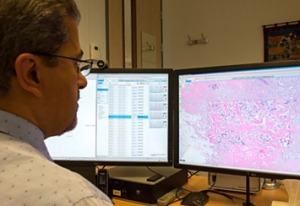by
Christina Hwang, Contributing Reporter | March 29, 2016

Pathology case viewer
Courtesy: Philips
If a new study goes according to plan, clinical pathologists in the U.S. may soon be able to interpret their samples faster than ever by using digital pathology whole slide imaging as a primary diagnostic tool.
Massachusetts General Hospital (MGH) will be a key testing site for the precision study, which will utilize Philips’ IntelliSite Solution for digital pathology disease detection. If the device is found to be consistently reliable the study might influence the FDA regulatory process for whole slide imaging, and allow pathologists to move away from the conventional analog process of examining glass slides under a microscope.
“You give one lab, in this case, MGH, five instruments. They put them side by side and have one pathologist read slides from all five and make sure he/she makes the same calls. They do a washout where they don’t do any reads for three to four weeks, so they forget the images, and then do the study again,” Russell Granzow, General Manager of Philips Digital Pathology Solutions, told HCB News.



Ad Statistics
Times Displayed: 1581
Times Visited: 8 Keep biomedical devices ready to go, so care teams can be ready to care for patients. GE HealthCare’s ReadySee™ helps overcome frustrations due to lack of network and device visibility, manual troubleshooting, and downtime.
Pathologists play a critical role in the detection and diagnosis of many diseases, including cancer. Many tissue-based diagnoses are made through analysis that is performed on a microscope using sections on glass slides, and with the shipment of these glass slides, risk being damaged or lost.
“There are a number of benefits to whole slide imaging, most notably the ability to have a very precise image capture, which allows pathologists to review the same slides under the same conditions,” said Granzow, “There is also the ability to archive without having to save the glass.”
A major study undertaken last year in the UK, with results published last December in the journal
Histopathology, looked at the
reliability of digital pathology in comparison to the analog approach to interpretation. For that research, 17 pathologists at University Hospital Coventry used the Omnyx Precision digital pathology solution, a joint venture between GE Healthcare and University of Pittsburgh Medical Center (UPMC).
They evaluated biopsies and resections from more than 3,000 patients using both microscopes and the digital pathology system to determine if there were any statistical differences in the accuracy of the diagnoses. Out of 3,017 cases, there were 72, or only 2 percent, where the glass slide and digital case diagnosis did not agree with each other. In just three cases, the digital platform was determined to be responsible for the variance.

